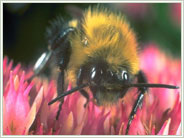 There are several species of stinging insects found in North Carolina, including:
There are several species of stinging insects found in North Carolina, including:
Yellow jackets: These aggressive wasps are known for their bright yellow and black coloring. They build nests in the ground or in trees and can sting repeatedly.
Hornets: Hornets are larger than yellow jackets and build paper nests that hang from trees, shrubs, or buildings. They can be very aggressive if their nest is disturbed.
Paper wasps: These wasps are named for the paper-like material they use to build their nests. They can be found in trees, bushes, and under eaves of buildings.
Bumblebees: Bumblebees are large, fuzzy bees that can sting but are not as aggressive as other stinging insects. They can be found in gardens, meadows, and other open areas.
Honeybees: Honeybees are important pollinators but can also sting if they feel threatened. They are social insects that live in hives and can be found in gardens and other areas with flowers.
It's important to be cautious around stinging insects and to avoid disturbing their nests. Even though insect stings can be painful, itchy, and uncomfortable, they are usually not a significant healthcare concern. However, insect stings can cause allergic reactions in some people. If you are stung, remove the stinger as quickly as possible and apply ice to reduce swelling. Seek medical attention if you experience a severe reaction to a sting.
• The stinger can be removed by scraping a card (like a driver’s license or credit card) across the wound.
• Wash the area with warm, soapy water and place a cold cloth over the area to aid with swelling.
• Ibuprofen may help with pain; diphenhydramine may help with allergic reactions such as minor itching or swelling.
Call 911 immediately if your chest is tight, you have difficulty breathing, or experience significant swelling around the face or neck.
Fire ants: These small, reddish-brown ants are known for their painful stings. They build nests in the ground and are often found in lawns and other outdoor areas.
Mosquitoes: Mosquitoes are small, flying insects that can transmit diseases such as West Nile virus and Zika virus. They breed in standing water and are most active at dawn and dusk.
It's important to take steps to prevent mosquito bites: wear long sleeves and pants, use insect repellant, and remove standing water from around your home. If you are bitten by a fire ant, wash the area with soap and water and apply a cold compress to reduce swelling. Seek medical attention if you experience a severe allergic reaction.
Call NC Poison Control at 1-800-222-1222 or chat from this site for questions about a bite, sting or for more information.